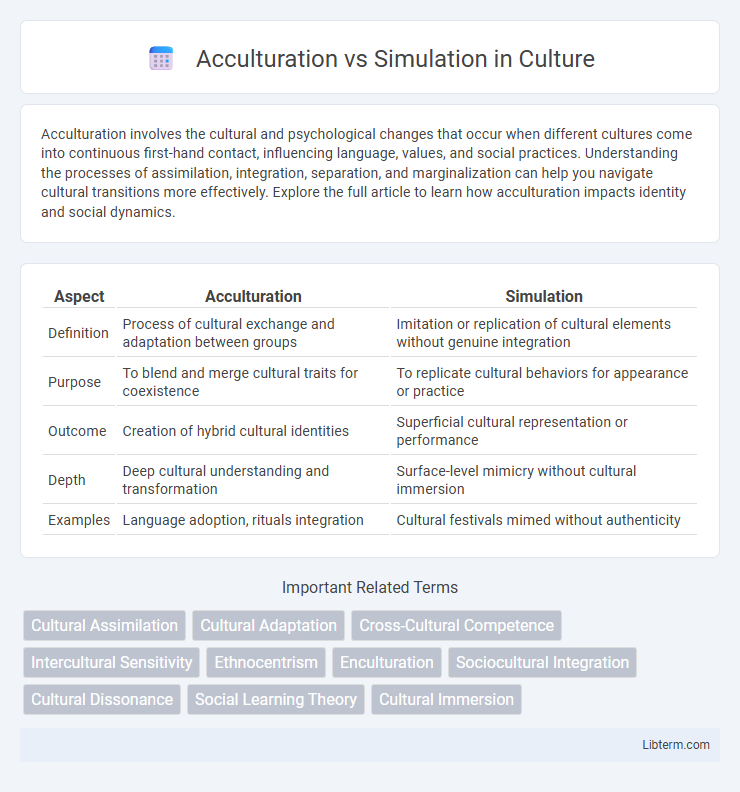Acculturation involves the cultural and psychological changes that occur when different cultures come into continuous first-hand contact, influencing language, values, and social practices. Understanding the processes of assimilation, integration, separation, and marginalization can help you navigate cultural transitions more effectively. Explore the full article to learn how acculturation impacts identity and social dynamics.
Table of Comparison
| Aspect | Acculturation | Simulation |
|---|---|---|
| Definition | Process of cultural exchange and adaptation between groups | Imitation or replication of cultural elements without genuine integration |
| Purpose | To blend and merge cultural traits for coexistence | To replicate cultural behaviors for appearance or practice |
| Outcome | Creation of hybrid cultural identities | Superficial cultural representation or performance |
| Depth | Deep cultural understanding and transformation | Surface-level mimicry without cultural immersion |
| Examples | Language adoption, rituals integration | Cultural festivals mimed without authenticity |
Understanding Acculturation: Key Concepts
Acculturation involves the process where individuals or groups adopt cultural traits from another culture due to direct contact, influencing behaviors, values, and social patterns. Key concepts include assimilation, integration, separation, and marginalization, which describe varying degrees of cultural adaptation and identity retention. Understanding these dynamics is crucial for analyzing how cultural exchange impacts social cohesion and individual identity formation.
What is Simulation in Cultural Contexts?
Simulation in cultural contexts refers to the process of imitating or recreating cultural behaviors, practices, or experiences without authentic engagement or direct participation in the original culture. It often involves the superficial adoption of cultural symbols, rituals, or customs for representational purposes, which can lead to misunderstandings or misinterpretations of the culture being simulated. Unlike acculturation, where individuals genuinely internalize and adapt to a new culture through interaction and integration, simulation remains at a surface level, emphasizing appearance over deep cultural assimilation.
Acculturation vs Simulation: Fundamental Differences
Acculturation involves acquiring cultural traits and social patterns from another group through prolonged contact, leading to changes in identity and behavior, whereas simulation refers to imitating certain cultural aspects without genuine internalization or identity transformation. Acculturation results in authentic cultural adaptation, reflected in language, values, and social norms, while simulation often remains superficial, focusing on external behaviors without deeper cognitive or emotional integration. These fundamental differences highlight that acculturation transforms cultural identity, whereas simulation primarily reproduces appearances.
Historical Perspectives on Acculturation
Historical perspectives on acculturation emphasize the exchange and adaptation processes occurring when different cultures come into direct contact, leading to changes in social practices, language, and belief systems. Early anthropological studies, such as those by Robert Redfield and Melville Herskovits, documented acculturation as a dynamic and bidirectional process influencing both dominant and subordinate groups. Unlike simulation, which involves mimicking behaviors without cultural integration, acculturation results in substantive cultural transformation and hybridization over time.
Simulation Models in Sociocultural Studies
Simulation models in sociocultural studies replicate complex social interactions and cultural dynamics to analyze acculturation processes without direct human involvement. These models employ agent-based algorithms to simulate individual behaviors, cultural traits exchange, and adaptation mechanisms within diverse populations. By generating predictive insights and testing hypothetical scenarios, simulation models enhance understanding of cultural integration, identity negotiation, and social cohesion in multicultural environments.
Impacts of Acculturation on Identity Formation
Acculturation profoundly influences identity formation by shaping individuals' cultural values, beliefs, and behaviors as they adapt to a new cultural environment. This dynamic process fosters bicultural or multicultural identities, enhancing social integration and psychological well-being while sometimes causing internal conflicts or identity confusion. Research indicates that positive acculturation experiences contribute to stronger self-concept and resilience, whereas negative experiences may lead to marginalization or identity fragmentation.
The Role of Technology in Cultural Simulation
Technology plays a pivotal role in cultural simulation by enabling immersive virtual environments and digital platforms that replicate or reinterpret cultural experiences. Advanced tools like augmented reality (AR), virtual reality (VR), and artificial intelligence (AI) facilitate the creation of simulated cultural settings, allowing users to engage with and understand diverse traditions without physical presence. These innovations influence acculturation processes by providing alternative means to explore and adopt cultural traits in a controlled, customizable digital context.
Real-World Examples: Acculturation and Simulation
Acculturation occurs when immigrants adopt the cultural traits of a new society while maintaining aspects of their original identity, such as Mexican Americans blending traditional celebrations with mainstream U.S. holidays. Simulation involves creating artificial environments or scenarios, exemplified by flight simulators used by pilots to safely practice responses to real-world emergencies without actual risk. These processes highlight how cultural integration and skill acquisition manifest in both social and technological contexts.
Challenges and Critiques of Acculturation
Acculturation faces challenges such as cultural homogenization, identity loss, and psychological stress among minority groups adapting to dominant cultures. Critics argue that acculturation often oversimplifies complex cultural interactions, neglecting power imbalances and resistance from subordinate communities. This complexity raises concerns about the ethical implications of imposing cultural norms and the potential marginalization of indigenous traditions.
Future Directions: Integrating Acculturation and Simulation
Future directions in acculturation research emphasize integrating simulation techniques to model dynamic cultural adaptation processes more accurately. Simulation tools enable researchers to predict acculturation outcomes by incorporating complex variables such as social networks, identity shifts, and environmental changes. This integration promotes a deeper understanding of how individuals and groups navigate cultural transitions in increasingly multicultural societies.
Acculturation Infographic

 libterm.com
libterm.com